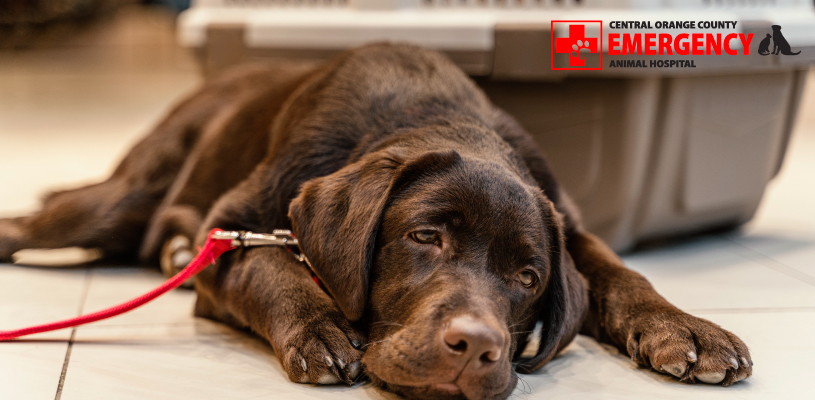Identifying Signs of Dental Pain in Dogs: A Guide for Concerned Pet Parents
Dental pain in dogs distresses your furry friend and can be quite worrying for you as a pet parent. Recognizing the signs of dental discomfort is crucial for the timely and effective management of potential oral health issues. This blog post will guide you through the various symptoms of dental pain in dogs, helping you understand when your beloved pet might need veterinary attention.
The Importance of Dental Health in Dogs
Dental health is a vital aspect of overall wellness in dogs. Poor dental health can lead to many problems, including severe pain, infection, and even systemic issues affecting the heart, liver, and kidneys. Regular dental check-ups are essential, but being aware of the signs of dental pain can help you catch issues before they escalate.
Recognizing Signs of Dental Pain in Dogs
Changes in Eating Habits: One of the earliest signs of dental pain is a change in eating habits. If your dog suddenly seems reluctant to eat, chews on one side of their mouth, or has stopped chewing their dry food, it might be due to discomfort in their mouth.
Bad Breath (Halitosis): While dog breath isn’t typically fresh, excessively foul breath can indicate dental issues, such as gingivitis or dental abscesses.
Pawing at the Mouth or Face: Dogs experiencing dental pain may frequently paw at their mouth or rub their face against the floor or furniture to alleviate discomfort.
Bleeding Gums: If you notice pink or red in your dog’s water bowl or on its chew toys, it could be a sign of bleeding gums, which are often associated with gum disease.
Visible Tartar on Teeth: Yellow or brown buildup on the teeth, especially near the gum line, is a sign of tartar that can lead to painful gum disease if not treated.
Drooling: Excessive drooling, especially if the drool is tinged with blood, is a common indicator of oral pain or issues.
Swollen or Receding Gums: Swollen, red, or receding gums can indicate inflammation or infection, which can cause significant dental discomfort.
Loose or Missing Teeth: Loose or missing teeth can occur due to advanced dental disease and are often accompanied by significant pain.
What to Do If You Suspect Dental Pain in Your Dog
Consult Your Veterinarian: At the first sign of dental discomfort, schedule a visit to your veterinarian. They can perform a thorough examination to assess the extent of any dental issues.
Professional Dental Cleaning: Your vet may recommend a professional dental cleaning performed under anesthesia, which can dramatically improve your dog’s oral health.
Home Care: Brush your dog’s teeth daily with toothpaste formulated specifically for dogs. This can help prevent plaque buildup and other dental problems.
Dietary Adjustments: Feeding your dog specially formulated dental diets or treats can help reduce plaque and tartar buildup, complementing your home dental care routine.
Preventive Care and Treatment Options for Dental Pain in Dogs
Preventive care is crucial in maintaining your dog’s dental health and avoiding the onset of painful conditions. Here are some effective strategies and treatments that can help keep your dog’s teeth healthy:
Regular Dental Check-Ups: Schedule regular dental check-ups with your veterinarian. These visits allow for early detection and treatment of potential problems before they develop into severe conditions.
Professional Dental Cleanings: Consider professional cleanings performed by a veterinarian. These cleanings go beyond what can be achieved at home by thoroughly cleaning both above and below the gumline, removing plaque and tartar, and checking for any signs of dental disease.
At-Home Dental Care: Establish a daily dental care routine at home. This includes brushing your dog’s teeth with toothpaste made explicitly for canines. Never use human toothpaste, as it contains ingredients that can harm your pet.
Dental Diets and Treats: Incorporate dental diets and treats that are designed to reduce tartar and plaque build-up. These products work by mechanical abrasion to clean teeth as your dog chews.
Chew Toys: Provide safe and effective chew toys that encourage chewing and help clean your dog’s teeth naturally. Toys and chews made from durable materials can give your dog hours of teeth-cleaning action and enjoyment.
Pain Management: If your dog suffers from dental pain, your veterinarian can recommend medications to manage the pain effectively. This is often a crucial aspect of treatment that can improve your dog’s quality of life while dental issues are being addressed.
Understanding the Signs of Serious Dental Issues
Recognizing more severe signs that require immediate veterinary intervention can prevent significant health issues and potential emergencies. Symptoms such as severe halitosis, difficulty eating, and visible swelling or pus indicate that professional treatment is needed promptly.
Advanced Dental Care Strategies for Dogs
Ensuring your dog maintains optimal dental health involves more than just recognizing the signs of dental pain; it requires a proactive approach to dental care. Here’s how you can incorporate advanced dental care strategies to prevent common dental problems:
Professional Dental Checkups and Oral Exams: Regular dental checkups by a qualified veterinary dentist are essential for maintaining your dog’s oral health. These visits typically include a comprehensive oral exam that helps detect early signs of potential issues like tooth root exposure or bone loss, which can be critical in preventing severe dental disease.
The Role of Dental Hygiene in Preventive Care: Daily brushing remains the cornerstone of good dental hygiene. Using vet-recommended toothpaste and brushes, daily brushing can drastically reduce plaque build-up and prevent the progression to tartar, which harbors bacteria leading to gum disease and tooth decay.
Importance of Dental Diets: Incorporating a dental diet can be a practical approach to dental health. These diets are specially formulated to mechanically clean the teeth as your dog chews, helping to reduce plaque and maintain healthier gums and teeth.
Tooth Extraction and Management of Fractured Teeth: Sometimes, preventive measures might not be enough if the dental issues have progressed. Tooth extraction or a professional’s management of fractured teeth may become necessary to alleviate pain and prevent further complications.
Utilizing Water Additives: Water additives are a simple yet effective way to enhance your dog’s oral hygiene. These products are designed to be added to your dog’s drinking water and help reduce plaque and freshen breath between brushings.
Addressing Bone Loss: Bone loss around the teeth can lead to serious dental issues. Regular dental X-rays during checkups can help identify and address bone loss early, ensuring appropriate measures are taken to preserve your dog’s dental and overall health.
Proactive Dental Care for Dogs
Being vigilant about dental health can significantly enhance your dog’s quality of life. Understanding and responding to the signs of dental pain can prevent serious health issues and ensure that your pet remains happy and healthy. Remember, regular veterinary visits and proper oral hygiene are the best defenses against dental problems in dogs.
Are you worried about your dog’s dental health? Contact us today to schedule a dental examination. Let us help you ensure your dog’s mouth stays healthy and pain-free.


